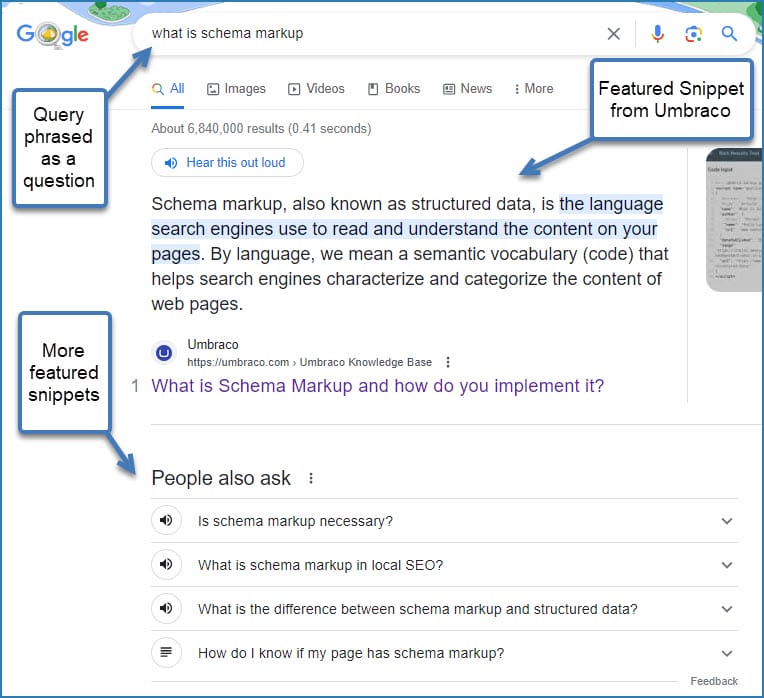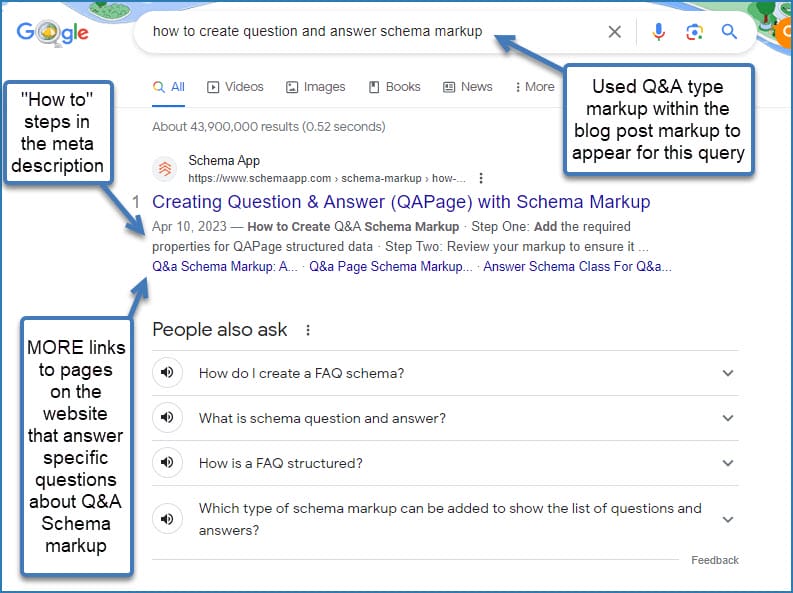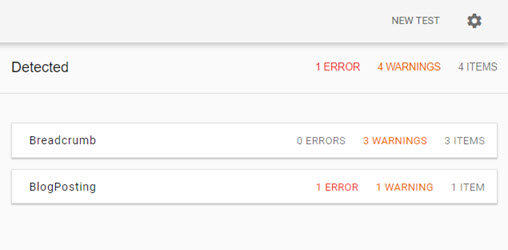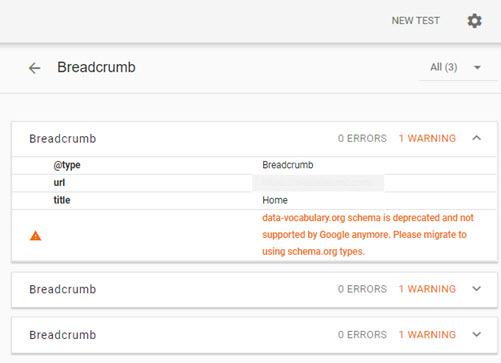Structured Data – Schema Markup

Meet Top Of The List’s stand-alone service offering: Structured Data – Schema Markup. Although that is a mouthful by itself, Structured Data is also known as Schema Markup. One of its benefits is to produce Rich Results — also known as Featured Snippets — at the top of Google’s SERP page.
Applying structured data using the correct methodology creates a very powerful way to attract visitors to your website. Let our expert team plan and implement this custom code to make your site listings stand out on search result lists. Together we offer an:
Elegant Solution * Markup Expertise * Custom Level of Support
Why do I need structured data?
Your website makes sense to humans, but it probably doesn’t necessarily make sense to machines.
Structured Data applies Schema.org vocabulary in the form of code to your digital content. We add and customize this code on your website to help machines and search engines understand its content. Visitors do not see the code.
Prepare your site for AI-driven search
The primary purpose of schema markup is to help search engines clearly understand and contextualize your website’s content, page by page. This results in better matching of a query to a web page.
What’s more is that adding structured data to your website prepares it for AI-driven search. This is because the AI bots collect accurate schema markup and use it for their search. The bots pay little or no attention to sites that do not use schema or those that have schema errors.
If you wish your site to appear in AI-driven search, accurate schema is essential.
Improve visibility with Rich Results
Structured data helps to improve findability and visibility of websites. In turn, this leads to improved organic and voice search performance.
On average, customers* enjoy:
- 5% more impressions
- 26% more clicks
- 20% higher CTR (click-thru rate)
- 150% more time on rich result pages
- 3.6x more interaction
- 9 positions higher rank in search
- Higher revenue
All of which they attribute to the addition of structured data for rich results. Here’s an example of some of schema’s impact:
eCommerce Store Rich Results**

The bottom blue line says it all. In less than 1 month, “Products” saw:
- Increased CTR by 12.96%
- Improved Position (Rank) by 38%, or roughly 10 positions
How does structured data bring in these additional visitors?
First, structured data helps your site stand out with rich results. We add code to your site to attract “rich results” in its search engine listings. Eye-catching visuals show up on search engine result pages (SERPs) that:
- Attract the attention of the user
- Bring your content alive
- Take up more real estate on the search results page
- Help you outshine your competition.
Google offers a variety of rich result features. For instance, rich results are available for Local Business, Products, Events, FAQs, Videos, How-Tos, Articles, and so on. To see how they make your site pop, here are a few examples of what the results look like when searching on various terms:
Example 1 – FAQ
When FAQs are marked up in schema, they have a better chance of being displayed for queries that ask questions. From a technical markup viewpoint, the FAQ can be marked up using numerous page types, not just the FAQ type.
In fact, Google announced in August 2023 that “Going forward, FAQ (from FAQPage structured data) rich results will only be shown for well-known, authoritative government and health websites.” Nonetheless, the top answer below includes a paragraph from Umbraco as the first result. It is marked up in Schema using the FAQ type.
“What is Schema Markup?“

“How to create question and answer schema markup”
In the example below, the top result for the query “how to create question and answer schema markup” is marked up overall as a blog post. But within the post, it contains additional Question and Answer type markup. The listing even adds links to other closely related pages on the site that expand on the answer, showing examples of the Q&A markup itself.

Regardless of how these featured snippets are marked up and displayed, answers to questions fare better if they are the best answers and are marked up with schema!
Example 2 – Product
“Product” organic rich results. This listing from Newport itself shows a Breadcrumb at the very top of the listing. A star rating and the number of votes used in averaging the rating are added to the bottom of the listing.

“Product” organic rich results. This listing from REI shows added details including weight, best use, outsole, and toe coverage and price along with the standard results:

Note the listing from REI likely has more structured data than the one from Keen Footwear itself since it includes more information. That is because Newport likely doesn’t sell the shoes directly from its site.
“Product” carousel rich results from Newport:

Wouldn’t you love to have your products with all these images on Google’s SERP page?
Brand Control
Structured data also gives you greater brand control. Your opportunity to make a great first impression with a potential customer starts in the SERP. You can own that customer experience right from the beginning. Structured data gives you more control over your brand. You define exactly how you want your brand content to display. You also can control where and how the structured data is distributed on your website so the right message shows up in the rich result.
Business Intelligence
Finally, structured data helps you boost business intelligence. Creating the markup is only the beginning. You can also use it to understand, in greater depth, your website performance:
- Filter schema.org types in Google Analytics, giving you deeper insight into your traffic. Examples include Videos, Products, FAQs, How-tos, etc.
- Once structured data is on your website, you can add the schema.org properties to Google Analytics to understand your visitor behavior in more depth. As an example, an e-commerce site could filter its products by color or shirt size and in doing so, would then provide insights on what color drives the largest shopping cart. Imagine the possibilities!
Doesn’t my web platform add structured data automatically?
Your website platform might add some structured data. But Schema changes daily. Your website platform probably isn’t updated that often. When updates are prioritized, structured data may not be a priority on its next version list. The result is that most platforms add minimal, standardized schema. You not only blend in with everyone else, but your site’s code may no longer be correct. As an example:

In the screenshot above, the three Breadcrumb warnings are coming from Shopify’s automated schema. The BlogPosting is coming from our tool and partial manual markup. The error is the result of a missing image in the post. We immediately informed our client and added their image.

Upon inspecting the Breadcrumbs warning, the test says that breadcrumbs are no longer supported by Google. Shopify should remove them from its Schema. Fortunately, our client is safe because the SchemaApp tool filters out the Shopify structured data. Google registers no errors as a result. All the other Shopify customers still have the issues though.
It must be expensive, isn’t it?
It could be but doesn’t have to be.
The expensive and complex route:
Average structured data developers make upwards of $200 per hour just for the development.
- The code is complex and schema features change often. Not only does someone need to write the new code, but they also need to go back and update it when new requirements are added.
- Someone at the company must keep up to date with the new requirements so they can tell the developer to update the code.
- When the developer updates the code to meet the new requirements, she realizes the code links to many other parts of the code.
- The code that is “linked to” may break as a result of the earlier change. And the cycle continues.
This can turn into a nightmare!
The best route
Use a mix of:
- An elegant solution in the form of a tool. We use SchemaApp for this purpose and are a partner and reseller with the SchemaApp folks. The tool aids in getting all the syntaxes and relationships correct. It still takes knowledge and skill, but it makes our job a lot easier!
- SchemaApp is updated constantly to reflect changes in schema.org requirements.
- The custom structured data we create is stored in its database. The interface alerts us if there are warnings or errors in our existing code which may have been a result of Schema.org changes.
- We can then update that code quickly and easily!
- Since a change in one Schema table can create errors in other tables linked to it, our interface shows us any domino-type issues that need to be addressed also.
- Markup expertise. Level of expertise can make a big difference between anyone who marks up your website. Top Of The List provides:
- Years of expertise working with structured data and SchemaApp.
- Knowledge to keep up with Schema changes and new features happening at a lightning pace.
- A plan for your site to zero in on the best areas to markup its content.
- Custom level of support. Structured data requires working with you. You know your product or service better than anyone. The experts marking up your content offer a personal level of support, asking the right questions to accurately mark up your website.
Start implementing structured data for your business! It’s the way to prepare for the future of AI, stand out from your competitors, draw more prospects into your website, and start reaping the rewards of additional revenue.
Contact us and ask for a free quote today!
*SchemaApp Enterprise customer, 2019-2024




